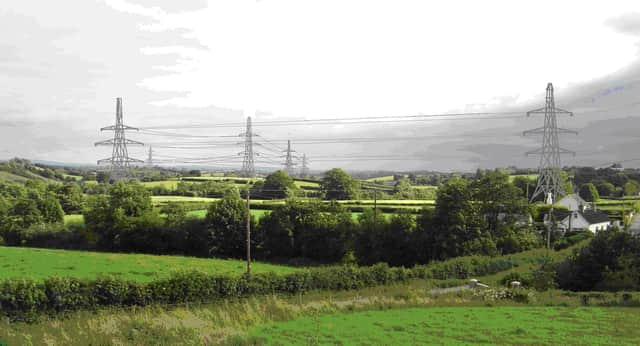Cross-border electricity line can go ahead despite a ‘legal flaw’


Mr Justice Scoffield declared today that Infrastructure Minister Nichola Mallon approved the North South Interconnector in breach of a current requirement to refer the issue for Stormont Executive agreement.
But he held that she kept colleagues in the power-sharing cabinet informed of her intention to secure the legislative change needed to take the decision on the scheme.
Advertisement
Hide AdAdvertisement
Hide Ad“This was very far from the type of case where the Minister has sought to ‘go on a solo run’,” the judge said.
His ruling came in a legal challenge mounted by a group of landowners opposed to the Interconnector.
In September 2020 planning permission was given for the 400kv overhead electricity line which is to stretch from Co Tyrone to Co Meath.
The project received the green light after previous consent obtained in the absence of a minister was quashed.
Advertisement
Hide AdAdvertisement
Hide AdMembers of Safe Electricity Armagh and Tyrone (SEAT) sought to judicially review Mrs Mallon’s decision in a case centred on Northern Ireland’s constitutional arrangements and newly introduced legislation.
Passed last year, the Executive Committee (Functions) Act gives ministers more power to act autonomously.
However, SEAT’s legal team claimed the proposed Interconnector was unilaterally approved in breach of the Good Friday Agreement
The group’s lawyers argued it is a significant or controversial, cross-cutting issue which should have been referred to the Executive.
Advertisement
Hide AdAdvertisement
Hide AdMrs Mallon remained under a requirement within the Northern Ireland Act 1998 to act in accordance with the Stormont Ministerial Code, they contended.
Crucially, according to SEAT’s case, amendments introduced by the 2020 Act were not followed through with the necessary changes to the Ministerial Code.
Government lawyers maintained that the new legislation gave Mrs Mallon the legal power to authorise the project without taking it to her Executive colleagues.
Ruling on the challenge today, Mr Justice Scoffield described a mismatch between part of the Northern Ireland Act and the operation of the Ministerial Code as “somewhat of a mess”.
Advertisement
Hide AdAdvertisement
Hide AdHe accepted that the Minister acted in breach of obligations under the current version of the Code.
However, she had briefed Executive colleagues who supported her proposed course of action for dealing with regionally significant planning applications considered to be urgent.
The Minister was also prepared to allow the Executive to act as the decision-making authority in the period before the necessary amendments to the Northern Ireland Act could be made, the judge pointed out.
He confirmed: “I will grant a declaration to the effect that the Department for Infrastructure Minister did not act in accordance with the provisions of section 2.4 of the Ministerial Code by failing to refer the significant and/or controversial decision on the relevant planning applications to the Executive Committee to be considered by it for discussion and
agreement.
Advertisement
Hide AdAdvertisement
Hide Ad“I do not consider that any failing on the Minister’s part was culpable in the circumstances of this case.”
Deciding not to quash the planning permission, Mr Justice Scoffield took into account the delay and public interest in the Interconnector project.
He also noted that no challenge was mounted on any planning-related grounds.
Urging the Executive to change the Ministerial Code to reflect the modified requirements within the Northern Ireland Act, he added: “Had the necessary amendments been made at the appropriate time, it is unlikely that these proceedings would have been brought.”
Advertisement
Hide AdAdvertisement
Hide AdOutside court SONI, the operator of Northern Ireland’s electricity transmission system, welcomed the decision to uphold planning approval and pledged to continue engagement with landowners and communities.
Spokesperson Natasha Sayee said: “The North South Interconnector will be a key enabler for economic growth as part of a green recovery.
“It will create local construction jobs through its delivery programme, it will help reduce the cost of electricity and it will also provide a route to market for renewable energy, positioning Northern Ireland as a prime exporter of clean energy.”
SEAT’s solicitor, Paul Farrell of McIvor Farrell, said it was a significant judgment on the future good governance of Northern Ireland.
Advertisement
Hide AdAdvertisement
Hide AdHe added: “We are delighted that our clients have received a declaration from the court that the Minister’s actions, in failing to refer this matter to the Executive Committee, were unlawful.
“Our clients will now take some time to consider the court’s judgment in its entirety before considering their next steps.”
Comment Guidelines
National World encourages reader discussion on our stories. User feedback, insights and back-and-forth exchanges add a rich layer of context to reporting. Please review our Community Guidelines before commenting.